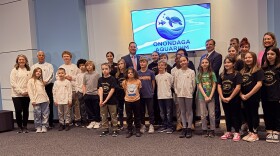A conference in Cleveland is tackling marine debris, the pieces of plastic that wash up on the river, ocean, or Great Lake shores. It's a issue that has affected the health and appearances of beaches around the world.
Marine debris also has a deadly effect on wildlife, especially birds.
“They can get entangled in fishing line or balloon string,” says Jill Bartolotta, an educator with Ohio Sea Grant. “They also eat plastic because they think its fish or a food item, which will eventually cause them to starve to death.”
Bartolotta says plastic fibers found in fish flesh recently raised broader concerns among researchers.
“There’s a lot of research being done where researchers around the Great Lakes are going to see how it affects not only the fish, but also humans consuming the fish,” says Bartolotta.
In 2014, Sarah Lowe of the National Oceanic and Atmospheric Administration created the Great Lakes Land-based Marine Debris Action Plan, a plan to increase awareness in communities. It involves workshops to educate teachers, students, and others about marine debris in the Great Lakes region. They also learn how to help -- through beach clean-ups or smarter conservation practices.
According to the Ocean Conservancy, the top 10 items found on beaches around the world are the same, no matter the coast. Cigarettes are most common, followed by plastic beverage bottles and food wrappers.
Bartolotta says the battle is far from over.
“Marine debris is going to be here for a long time,” explains Bartolotta. “This is a starting point to gather everyone together to begin to collaborate so we can have a really strong group of people moving forward in the Great Lakes.”
The conference in Cleveland is closed to the public, but Bartolotta says there will be a meeting in early 2017 where the community will learn of short and long-term goals to reduce plastic marine debris in lakes and rivers.







